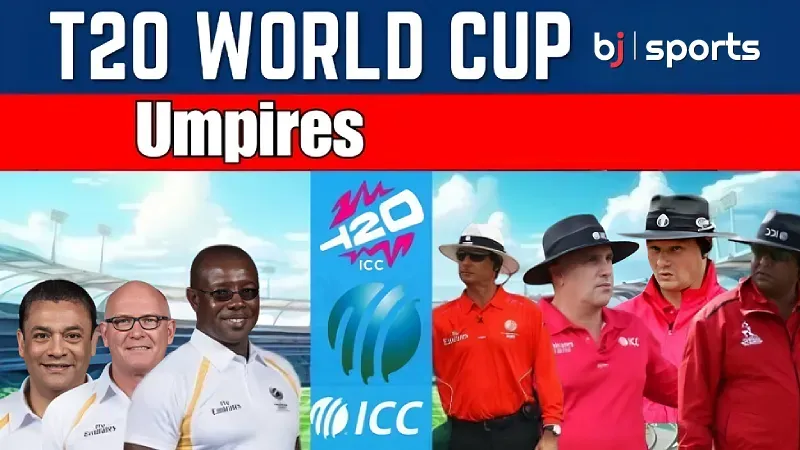Cricket, often referred to as a gentleman’s game, is not only about the players battling it out on the field. Behind every thrilling match and intense rivalry, there exists a group of unsung heroes who play a crucial role in ensuring fair play and upholding the spirit of the game. In this blog, we celebrate the umpires and match officials of the T20 World Cup, for their immense contribution to the tournament.
- The Umpires’ Role:
Umpires are an integral part of any cricket match, and their primary responsibility is to make crucial decisions on the field. In the fast-paced and high-pressure environment of T20 cricket, the role of the umpires becomes even more challenging. They are tasked with making split-second judgments on LBW appeals, catches, run-outs, and wides, among other decisions. Their ability to remain calm, composed, and impartial is commendable.
The T20 World Cup brings together the best umpires from around the globe. These officials undergo rigorous training and have extensive knowledge of the game’s rules and regulations. Their expertise in interpreting complex scenarios and applying the laws of the game ensures that matches are conducted fairly and without bias. Their presence instills confidence in players and fans alike, knowing that the game is in safe hands.
- Match Officials’ Contributions:
Apart from the umpires, match officials play a vital role in the smooth functioning of the T20 World Cup. These officials include match referees, scorers, and third umpires. The match referee oversees the conduct of the game, ensuring that it adheres to the highest standards of sportsmanship. They deal with disciplinary matters, evaluate the pitch and ground conditions, and maintain the tournament’s overall integrity.
Scorers, on the other hand, meticulously record every run, wicket, and delivery during the match. Their accurate and timely documentation forms the official record of the game, providing valuable statistical data for future analysis and reference. Their work often goes unnoticed, but it is essential for maintaining the game’s history and statistical records.
The third umpire, equipped with advanced technology, plays a crucial role in reviewing on-field decisions. They assist the on-field umpires in making accurate decisions on contentious matters such as run-outs, stumpings, and catches. Their ability to analyze replays from multiple angles ensures that the correct verdict is reached, reducing the chances of error.
- Challenges and Fair Play:
Umpires and match officials face numerous challenges during the T20 World Cup. The fast-paced nature of the format demands quick decision-making, often under immense pressure. They must be alert to spot and penalize any signs of unfair play, such as tampering with the ball, sledging, or excessive appealing. Their role extends beyond the technical aspects of the game; they are also responsible for maintaining discipline and upholding the spirit of cricket.
The T20 World Cup has witnessed some remarkable displays of fair play. Umpires and match officials have been instrumental in diffusing tense situations, enforcing the code of conduct, and ensuring that the game is played in the right spirit. Their presence on the field acts as a moral compass, setting an example for players to follow.
Conclusion:
As the T20 World Cup unfolds, let us not forget to acknowledge and celebrate the unsung heroes who work tirelessly behind the scenes. Umpires and match officials play a pivotal role in ensuring fair play, upholding the spirit of the game, and maintaining the tournament’s integrity. Their dedication, expertise, and unwavering commitment to the sport deserve our utmost respect and admiration. So, the next time you watch a T20 match, take a moment to appreciate the off-field heroes who contribute to the game’s excitement and uphold the values that make cricket a truly special sport.
